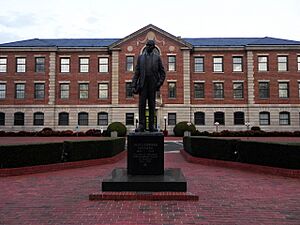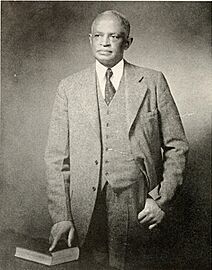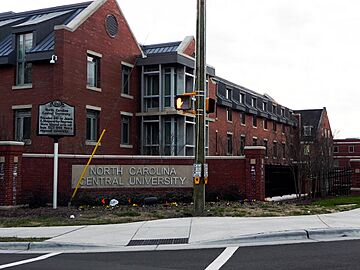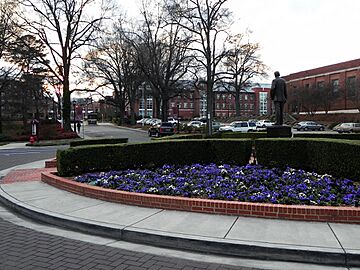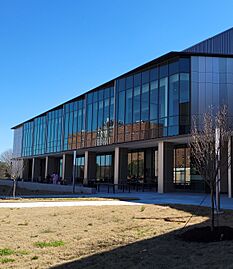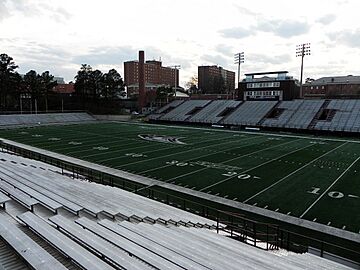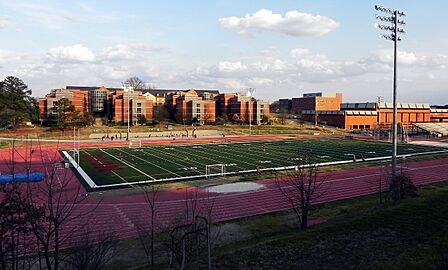North Carolina Central University facts for kids
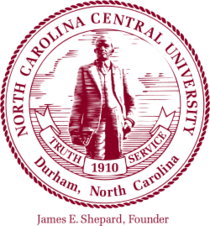 |
|
|
Former name
|
National Religious Training School and Chautauqua for the Colored Race (1910–1915) National Training School (1915–1923) Durham State Normal School for Negroes (1923–1925) North Carolina College for Negroes (1925–1947) North Carolina College at Durham (1947–1969) |
|---|---|
| Motto | "Truth and Service" |
| Type | Public historically black university |
| Established | 1910 |
|
Parent institution
|
University of North Carolina |
| Accreditation | SACS |
|
Academic affiliation
|
TMCF |
| Endowment | $55 million (2021) |
| Chancellor | Karrie G. Dixon |
| Provost | Ontario S. Wooden |
| Students | 7,965 (Spring 2025) |
| Location |
,
United States
|
| Campus | Large city, 135 acres (0.55 km2) |
| Newspaper | The Campus Echo |
| Colors | Maroon and gray |
| Nickname | Eagles |
|
Sporting affiliations
|
|
| Mascot | Eddie the Eagle |
 |
|
|
North Carolina Central University
|
|
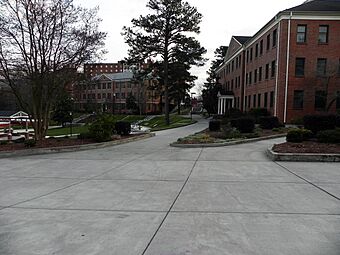
North Carolina Central University campus
|
|
| Location | Bounded by Lawson St., Alston Ave., Nelson, and Fayetteville Sts., Durham, North Carolina |
| Built | 1928 |
| Architect | Atwood & Nash; Public Works Administration |
| Architectural style | Colonial Revival, Georgian Revival |
| MPS | Durham MRA |
| NRHP reference No. | 86000676 |
| Added to NRHP | March 28, 1986 |
North Carolina Central University (NCCU or NC Central) is a public historically black university (HBCU) in Durham, North Carolina. It was founded in 1910 by Dr. James E. Shepard. At first, the school was private and was supported by donations.
In 1923, it became part of North Carolina's state school system. Over the years, it grew from a small training school into a large university. It added programs for advanced degrees, like master's and doctoral degrees.
In 1969, the school was given its current name, North Carolina Central University. Since 1972, it has been part of the University of North Carolina system. NCCU is also a member of the Thurgood Marshall College Fund, which supports students at HBCUs.
Contents
History
The Early Years
Dr. James E. Shepard founded the school in 1909. It was first called the National Religious Training School and Chautauqua for the Colored Race. A Chautauqua was a type of educational movement popular at the time. The school officially opened on July 5, 1910.
In 1915, the school was sold and renamed the National Training School. It received help from Margaret Olivia Slocum Sage, a wealthy woman from New York who cared deeply about education. The school focused on training Black teachers. This was very important because, during that time, many southern states did not provide enough funding for the education of Black citizens.
Becoming a State College
In 1923, the school began receiving money from the state of North Carolina. It was renamed the Durham State Normal School for Negroes. A "normal school" was a school that trained teachers for elementary grades.
Soon, the school expanded its programs to a four-year college degree. In 1925, it became the North Carolina College for Negroes. This made it the first state-supported liberal arts college for Black students in the United States. The first class to complete the four-year program graduated in 1929.
The college continued to grow. It added graduate programs, which are for students who have already earned a college degree. A School of Law was added in 1940, and a School of Library Science followed in 1941.
Becoming a University
In 1947, the school's name was changed again, this time to North Carolina College at Durham. That same year, the founder and president, Dr. Shepard, passed away. He was followed by several other presidents and chancellors who helped the university grow.
The school officially became North Carolina Central University in 1969. In 1972, it joined the University of North Carolina system, which includes 16 public universities across the state.
Dr. Karrie G. Dixon became the chancellor in 2024. She is the current leader of the university.
Campus
The NCCU campus is about one mile south of downtown Durham, North Carolina. It is also about three miles away from Duke University.
The campus has a special historic district with eleven buildings that were built before 1940. These buildings are known for their beautiful Georgian Revival style. Because of their historical importance, the campus was added to the National Register of Historic Places in 1986.
Academics
NCCU is part of the University of North Carolina (UNC) System. The university is organized into several schools and colleges that focus on different subjects.
Schools and Colleges
- School of Business
- School of Education
- School of Law
- School of Library & Information Sciences
- College of Health & Sciences
- College of Arts, Social Sciences & Humanities
- School of Graduate Studies
Research Centers
NCCU is also home to important research centers. These institutes work on new discoveries in science and technology.
- The Julius L. Chambers Biomedical Biotechnology Research Institute (BBRI)
- Biomanufacturing Research Institute and Technology Enterprise (BRITE)
Student Life
Life at NCCU is full of activities for students. There are more than 130 student clubs and organizations to join.
Students also run their own newspaper, the Campus Echo. It has been published since the university first opened in 1910. The newspaper covers campus news, sports, and local events.
Athletics
NCCU's sports teams are called the Eagles. They compete in NCAA Division I, which is the highest level of college sports. The teams are part of the Mid-Eastern Athletic Conference (MEAC).
The university has 14 teams for men and women. These sports include football, basketball, baseball, softball, track and field, and more.
The men's basketball team won the NCAA Division II National Championship in 1989. The football team has won many conference championships, including in 2022.
Notable Alumni
Many famous and successful people have graduated from NCCU. Here are a few of them:
- Ernie Barnes - A famous artist and former professional football player.
- Herman Boone - A high school football coach whose story was told in the movie Remember the Titans.
- Patrick Douthit ("9th Wonder") - A Grammy award-winning music producer.
- Mike Easley - A former Governor of North Carolina.
- Sam Jones - A famous basketball player who is in the NBA Hall of Fame.
- André Leon Talley - A well-known fashion journalist and editor for Vogue magazine.
- Ivan Dixon - An actor best known for his role in the TV show Hogan's Heroes.
- LeVelle Moton - A former NCCU basketball player who is now the head coach of the men's team.
Gallery
-
James E. Shepard, the founder of NCCU, around 1947.
 | May Edward Chinn |
 | Rebecca Cole |
 | Alexa Canady |
 | Dorothy Lavinia Brown |




